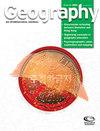现代奴隶制声明和英国主要的食品零售商
IF 1.1
4区 社会学
Q2 GEOGRAPHY
引用次数: 0
摘要
Gerry Kearns(2020)介绍了他关于非殖民化空间的文章,详细介绍了2020年6月在布里斯托尔港倾倒17世纪奴隶贩子爱德华·科尔斯顿雕像的细节。爱德华·科尔斯顿(Edward Colston)是皇家非洲公司(RAC)的成员(并担任过一段时间的副总督)。1680年至1686年间,RAC在英国垄断了非洲西海岸的黄金、白银、象牙和奴隶贸易。虽然奴隶制通常被视为“过去的问题”,并且根据国际法现在是一种犯罪,但所谓的现代奴隶制“仍然存在并且很好”(Landman和Silverman, 2019,第277页),并且仍然是“一种可行且有利可图的商业管理实践”(Banerjee, 2020,第415页)。此外,许多大公司目前在其业务和供应链中可能面临现代奴役的风险。尽管已经对过去奴隶制活动的景观消费进行了一些研究(例如Yankholmes和McKercher, 2015),但关于现代奴隶制的工作吸引了地理学家的有限关注(例如Lewis等人,2015;Brickell等人,2018;Brown et al., 2021)。这篇文章希望通过回顾他们的现代奴隶制声明,通过探索英国四大主要食品零售商“解决”现代奴隶制的方式之一,对这样的工作做一个小小的补充。本文章由计算机程序翻译,如有差异,请以英文原文为准。
Modern slavery statements and the UK’s leading food retailers
Introduction Gerry Kearns (2020) introduced his article on decolonising space with details of the dumping of the statue of the 17th-century slave trader, Edward Colston, in Bristol Harbour in June 2020. Edward Colston was a member (and for a while Deputy Governor) of the Royal Africa Company (RAC). Between 1680 and 1686, the RAC had a monopoly, in England, on trading along the west coast of Africa in gold, silver, ivory and slaves. While slavery is often seen as ‘problem of the past’, and is a now crime under international law, so called modern slavery is ‘alive and well’ (Landman and Silverman, 2019, p. 277), and remains ‘a viable and profitable management practice for business’ (Banerjee, 2020, p. 415). Further, many large companies are currently potentially exposed to the risk of modern slavery in their businesses and supply chains. Although some research has been undertaken on the consumption of landscapes of past slavery activity (e.g. Yankholmes and McKercher, 2015), work on modern slavery has attracted limited attention from geographers (e.g. Lewis et al., 2015; Brickell et al., 2018; Brown et al., 2021). This article looks to make a small addition to such work, by exploring one of the ways in which the UK’s four leading food retailers have ‘addressed’ modern slavery, by reviewing their modern slavery statements.
求助全文
通过发布文献求助,成功后即可免费获取论文全文。
去求助
来源期刊

Geography
GEOGRAPHY-
CiteScore
1.70
自引率
21.40%
发文量
21
期刊介绍:
An international journal, Geography meets the interests of lecturers, teachers and students in post-16 geography.
 求助内容:
求助内容: 应助结果提醒方式:
应助结果提醒方式:


